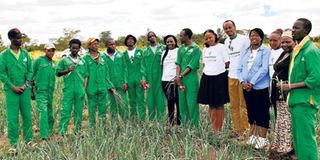Ready onion market brings tears of joy to jobless youth

Kamulu Youth Self-Empowerment Project members in green (and officials of Alternatives Africa) in their farm on the outskirts of Nairobi. LEOPOLD OBI | NATION
What you need to know:
- The 11-member group is growing bulb onions and indigenous vegetables on a leased one-acre farm. The farming venture is a step forward for the group that has been collecting garbage in the settlement since 2013, charging Sh150 a month per household.
- Charles Lusichi, KYSEP’s chairman, explains they leased the piece of land at Sh15,000 at the beginning of this year and started by planting the two vegetables, then later diversified into onions.
- Onions require fertile, well-drained soils with a pH of 6 to 7 while rainfall should be about 1,000mm per year. Thereafter, they require a fairly long dry period for ripening.
Kamulu, a peri-urban settlement off Kangundo Road on the outskirts of Nairobi, is characterised by tall acacia trees and vast savannah grassland.
Most land in the area lies fallow, although Kamulu’s black cotton soil appears fertile and ideal for crop cultivation.
River Athi, which snakes through the area, adds to its richness that members of Kamulu Youth Self-Empowerment Project (KYSEP) are cashing in on as they grow various horticultural crops.
The 11-member group is growing bulb onions and indigenous vegetables on a leased one-acre farm. The farming venture is a step forward for the group that has been collecting garbage in the settlement since 2013, charging Sh150 a month per household.
Every Saturday, they use their six donkeys and three carts to collect garbage from 300 households.
It is from the garbage that members of the group raised capital to lease an acre and grow amaranthus (terere) and black night shade (managu).
Charles Lusichi, KYSEP’s chairman, explains they leased the piece of land at Sh15,000 at the beginning of this year and started by planting the two vegetables, then later diversified into onions.
“We started with the indigenous vegetables because they are fast-maturing, thus, they provided us with financial support that we needed before going into red onions,” says Lusichi.
About two months after planting, the vegetables were ready for harvesting.
“We harvested the crops every week for three months,” he explains, adding that the harvest earned them Sh20,000, convincing some members who were unsure about farming to offer full support. Each bunch was sold at Sh10.
The group plants the vegetables in furrows with a spacing of 1 by 1ft. Once they sprout, they apply foliar fertiliser on the crops’ leaves to boost growth.
“We saved some of the money we got from selling our vegetables, and ploughed Sh25,000 into onion farming in March.”
However, before venturing into onions, they tested the soil to determine its nutrient content.
GO AHEAD
“The agronomist gave us the go ahead to grow onions. We bought a kilo of seeds and planted half,” says Theophilus Sambu, the group’s farm manager, adding the expert advised them to grow Red Connect variety due to its high yields.
Onions require fertile, well-drained soils with a pH of 6 to 7 while rainfall should be about 1,000mm per year. Thereafter, they require a fairly long dry period for ripening.
Onions are first planted in a nursery where they stay for a month before being transplanted to the field. They are ready for harvesting after about four months.
When transplanting, they add DAP fertiliser into the soil to boost growth as it provides nutrients necessary for roots development. They add CAN fertiliser two weeks later.
“We use organic chemicals to control weeds and pests,” says Sambu.
While they use furrow irrigation to grow the traditional vegetables, they have employed basin irrigation to grow onions.
“We are 50 metres away from River Athi, thus, water is not a problem. We hire a water pump and the operator to do the work at Sh1,800 per day. We irrigate the farm twice a week.”
The group harvests five to six tonnes of onions in a season, with a kilo going for Sh100. Kamulu group members, however, do not struggle to market the produce as they sell it to Alternatives Africa, a not-for-profit organisation that supports youth in entrepreneurship.
Lucy Mbaye, the social development manager at Alternatives Africa, says the organisation buys farm produce from young farmers and later sells it to restaurants.
This saves the farmers the agony of selling their produce to brokers, she says.
Anja Weber, a crop expert at SoilCares Ltd, says when growing onions in open field, the farm should be well irrigated before transplanting.
“If you plant onions too closely, bulb size will reduce,” warns Weber, noting weeds should be removed by uprooting and care should be taken in case of hoeing to avoid damaging the bulbs.
Waithera Gaitho, Alternatives Africa executive director, says agriculture can be an honest and viable source of livelihood for the youth, help reverse the urban influx and the drift into crime and idleness.





